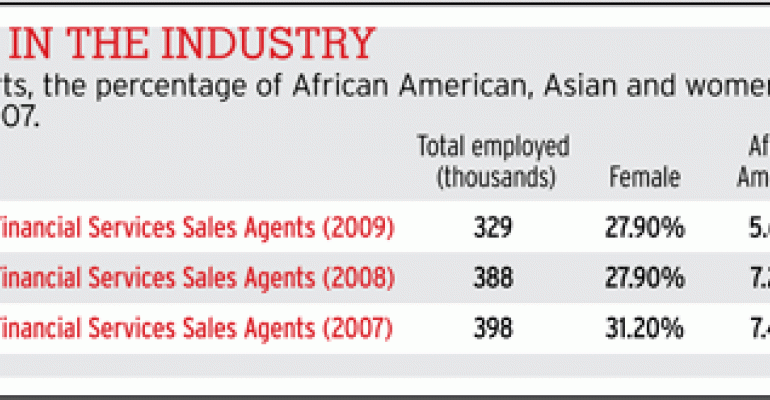Sometime in the next couple of months, George Clarke, an African American advisor with Diversified Investment Group in Silver Spring, Md., plans to launch a new non-profit organization aimed at supporting financial advisors of color and creating awareness of some of the unique issues they face in the industry. The group will be called the National Association of Minority Retail Registered Representatives and Financial Advisors, and Clarke is still in the planning stages for the group, drawing up a business and operating plan and looking for funding. Clarke, who has been in the business for about 10 years, lost much of his book of business when he moved firms, and he currently has about $1 million in AUM.
Some industry groups already exist for minority advisors, such as the Association of African American Financial Advisors, or Quad-A, aimed at providing networking opportunities and a support system for African American advisors. SIFMA and the Financial Planning Association also have diversity programs, as do a number of firms, such as Edward Jones, Merrill Lynch, Morgan Stanley and UBS. (By the way, firms are falling all over themselves to hire minority advisors, this magazine has been told over the years. But they have trouble finding any. The question is: Just what percentage of minority advisors should there be in the industry? Should the percentage exactly mirror minorities in the general population? It’s a tough question.)
Clarke wants his group to accomplish a number of things. For one, like many financial advisors, minority and not, Clarke has been struggling to rebuild his business after the market downturn of 2008 and 2009, and he hopes the group will help him and other advisors of color network.
He also hopes the group will work to expand the presence of advisors of color in low-income communities, which need financial planning, he says. To that end, the group will provide specialized training on how to manage and support low-income investors, he said. At the other end of the wealth spectrum, he hopes to help minority financial advisors attract wealthy minority sports and entertainment figures. He also wants to generate awareness of ongoing discrimination in the industry in term of pay.

“I am interested in developing some statistics on the earnings performance of minority brokers when compared with their white counterparts, as a means of raising awareness of the disparity of incomes in order to identify steps to help close those gaps,” he said.
A Step Forward
Following a number of discrimination lawsuits in recent years, many firms have been making a concerted effort to increase the number of minority reps in their ranks. Edward Jones, for example, launched its BRIDGE program, or “Building Results Through Inclusion Driven and Guided Efforts,” in 2009, which uses volunteers in particular areas and regions to recruit and retain minority advisors. Out of the firm’s 11,700 reps in the U.S., about 5 percent are minorities. But the firm sees an opportunity to grow its minority advisor base even more going forward, said Amy Williams, principal at Edward Jones and responsible for financial advisor diversity recruitment and retention.
In addition to its BRIDGE program, Edward Jones offers a cross-cultural development program, a training session where minority advisors can exchange ideas and share challenges, Williams said. They also hear from veteran advisors who have gone through some of the same challenges and succeeded. The firm also holds a leadership diversity forum for the top 15 percent of minority advisors. The summit is designed to not only equip strong performers as leaders but also to equip them to develop other minority leaders. The idea is, by having a more diverse advisor base, Edward Jones will hopefully be a company that is more attractive to more people, Williams added.

Three years ago, the Financial Planning Association launched its Diversity Scholarship, which pays for award recipients to attend its national conference every year. The conference can be expensive and intimidating, so the scholarship is meant to lower these barriers for minority planners, said Lee Baker, a financial planner with Apex Financial Services involved with FPA’s diversity initiatives.
The Association of African American Financial Advisors, also known as Quad-A and now in its 10th year, provides financial education for underserved and low-income communities, said Lanta Evans-Motte, a past president of the group and a rep with Raymond James Financial Advisors. Quad-A has regular meetings with guest speakers, as well as a speakers bureau, which trains and grooms African American advisors to speak in their communities.
Evans-Motte said there’s a significant learning curve when entering the industry, but having a support system and people one can call allows minority advisors to avoid some of the common mistakes.





